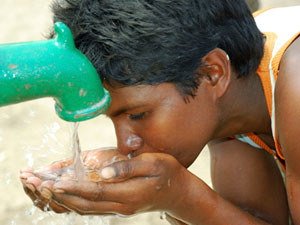Student teams selected to pursue clean water, safe food projects in India

Contacts:
Sri Latha Ganti, Acara Institute, ganti002@umn.edu, (612) 859-4151
Mary Hoff, Institute on the Environment, maryhoff@umn.edu, (612) 626-2670
Jeff Falk, University News Service, jfalk@umn.edu, (612) 626-1720
Winners of the 2011 Acara Challenge hail from the University of Minnesota, Cornell University, Duke University, and partner universities in India
MINNEAPOLIS / ST. PAUL (06/07/2011) —Four teams of students from around the world, including two teams with University of Minnesota College of Science and Engineering students, have been selected winners of the 2011 Acara Challenge. The competition, sponsored by the University of Minnesota Institute on the Environment’ s Acara program, invites international student teams to learn about and develop social businesses. Each winning team will receive $5,000 plus tuition to attend the Acara Summer Institute in Bangalore, India, this summer where they will move their proposed businesses from plan to action.
The four winning teams were chosen recently from a field of 21 teams involving some 175 students from 12 participating universities in the United States, India and Mexico. Teams were charged with developing business ideas to tackle global challenges of food and water security with the help of professors, industry mentors and international university partners.
“Taking part in the Acara Challenge has made me aware of conditions in slums, boosted my desire to be an entrepreneur and shown me how vital access to clean water and access to food is to the well-being of an individual and the entire community,” said Adam Witt, a civil engineering graduate student at University of Minnesota and member of the TextRA team.
The teams selected to receive further support from Acara are:
TextRA
A partnership of the University of Minnesota and TERI University in Delhi, this team will develop a cell- phone based solution to deliver information on food and water availability at various locations to malnourished and resource-deprived individuals. University of Minnesota College of Science and Engineering students who are part of this team include: Jessica Barros, civil engineering senior; Craig Hill, civil engineering graduate student; and Adam Witt, civil engineering graduate student.
Sewasan
Sewasan, another UMN-TERI team, is a cooperative that will create and maintain toilet facilities in urban slums for a fee. The presence of these facilities will decrease the spread of food- and water-borne illnesses, increase quality of life and provide employment for local residents. University of Minnesota College of Science and Engineering students who are part of this team include: Matt Carney, civil engineering senior; Emily Gross, civil engineering senior; and Kurt McIntire, civil engineering graduate student.
Swach
Students at Cornell University and the K.J. Somaiya Institute of Management in Mumbai created Swach to improve the lunch audit process in schools. Swach will provide kits and communication infrastructure to test for food quality, allowing time-strapped government auditors to focus where they are most needed.
Ankur Initiative
The Ankur Initiative, a collaboration between students at Duke University and the India Institute of Technology (IIT) Roorkee, aims to combat water stress in rural India by selling affordable miniature greenhouses to subsistence farmers to reduce water loss and increase crop yields.
Acara, a program of the University of Minnesota’ s Institute on the Environment, seeks to catalyze social entrepreneurship and create a new generation of global leaders by mentoring university students. The Acara Challenge is supported by the U of M's Institute on the Environment, Department of Civil Engineering, College of Science and Engineering, Carlson School of Management, University of Minnesota, 3M, Honeywell, National Collegiate Inventors and Innovators Alliance (NCIIA).
Visit acarainstitute.org or environment.umn.edu/acara for a full list of team members and more information about the teams’ goals and progress.
